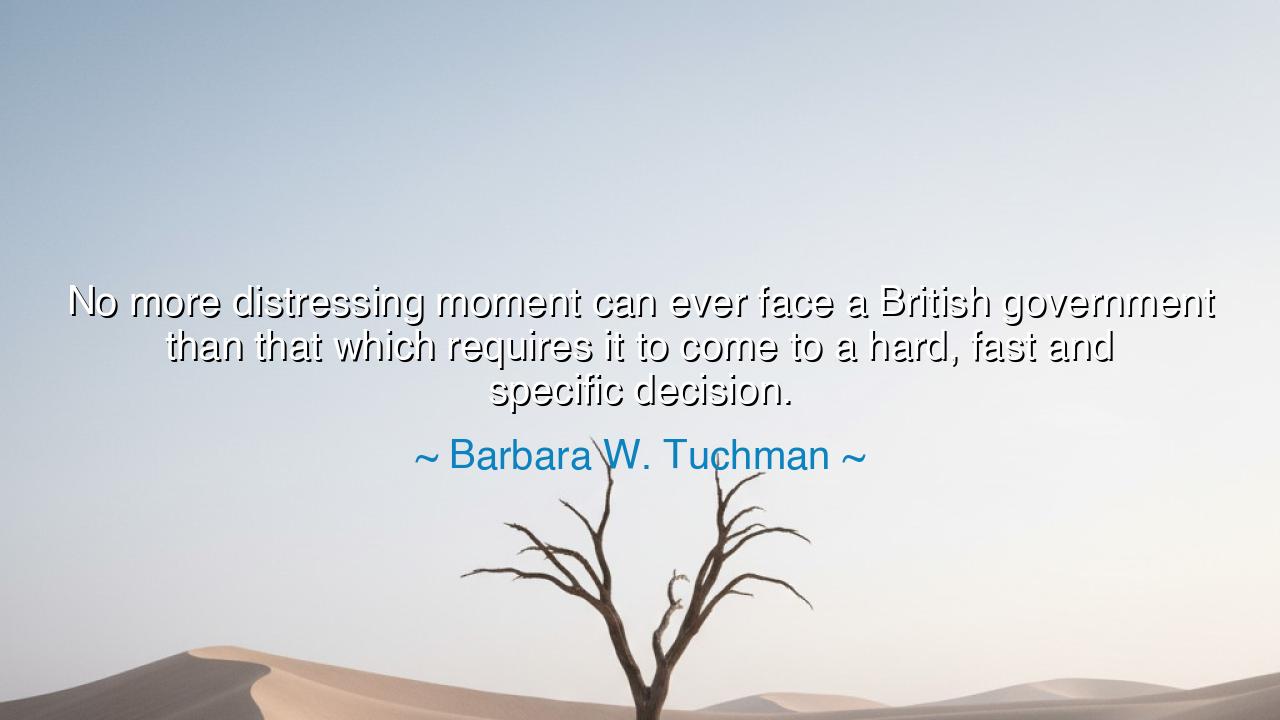
No more distressing moment can ever face a British government
No more distressing moment can ever face a British government than that which requires it to come to a hard, fast and specific decision.






Hearken, children of governance and seekers of wisdom, and attend to the words of Barbara W. Tuchman, who observed with piercing insight: "No more distressing moment can ever face a British government than that which requires it to come to a hard, fast and specific decision." In these words lies a profound meditation on leadership, responsibility, and the burden of decisive action. Tuchman reminds us that authority carries not only privilege, but a weighty duty: the necessity of choosing, of committing to a course when hesitation may invite peril.
The origin of Tuchman’s insight rests in her careful study of history and the trials of leadership. Governments, particularly parliamentary democracies like Britain’s, often navigate a sea of competing interests, expectations, and pressures. While debate, consultation, and deliberation are virtues, the moment arrives when a hard, fast, and specific decision must be made, and it is in that instant that leaders face their greatest distress and their ultimate test.
Consider the imagery of a “distressing moment.” Leadership, like the captain of a ship amidst a storm, must choose a course when winds howl and waves threaten to overwhelm. To delay is to invite disaster; to choose is to risk blame, criticism, or even catastrophe. Tuchman illuminates the human dimension of governance: the anxiety, tension, and moral responsibility that accompany decisions which shape the fate of nations, livelihoods, and lives.
History provides vivid exemplars. In 1938, British Prime Minister Neville Chamberlain faced the perilous question of how to respond to Hitler’s aggression in Czechoslovakia. The government deliberated, debated, and negotiated, yet ultimately had to decide whether to confront or appease. That moment, fraught with uncertainty and consequence, exemplifies Tuchman’s reflection: no deliberation can fully ease the anguish of making a decisive, irrevocable choice.
Tuchman’s reflection also illuminates the ethical weight of leadership. Decisions, especially those made in crises, are rarely clear-cut. Every choice carries consequences, often painful, and every decision-maker must balance principle, strategy, and the welfare of the populace. To act decisively is to assume responsibility for both triumph and failure, and it is this burden of specificity and commitment that renders governance so demanding.
The lesson is timeless: leadership is inseparable from the courage to decide. To govern is to face moments of tension where hesitation is as dangerous as error. The capacity to weigh information, consider consequences, and commit to a course—while bearing the moral and practical weight—is the hallmark of responsible authority. Tuchman teaches that those who lead must be willing to confront the anguish inherent in decisive action.
Practical actions emerge naturally: cultivate decisiveness alongside prudence; develop the ability to analyze complex situations rapidly; accept responsibility for the consequences of action; and understand that delay, while comforting, may magnify risk. By doing so, citizens and leaders alike honor the moral and practical demands of governance, ensuring that when critical moments arrive, they are prepared to act with clarity and integrity.
In sum, Tuchman’s words illuminate a profound truth: the gravest trials of government lie not in debate, but in the necessity of decisive, irrevocable action. Let this wisdom guide both rulers and citizens, emphasizing the courage, responsibility, and foresight required to navigate the storms of history. In embracing this burden, leaders uphold the enduring principles of justice, prudence, and the welfare of the nation.
If you wish, I can craft an even more epic, mythic version, turning Tuchman’s reflection into a heroic narrative of leadership, moral courage, and the decisive trials that define history—perfect for immersive audio storytelling. Do you want me to do that?






AAdministratorAdministrator
Welcome, honored guests. Please leave a comment, we will respond soon